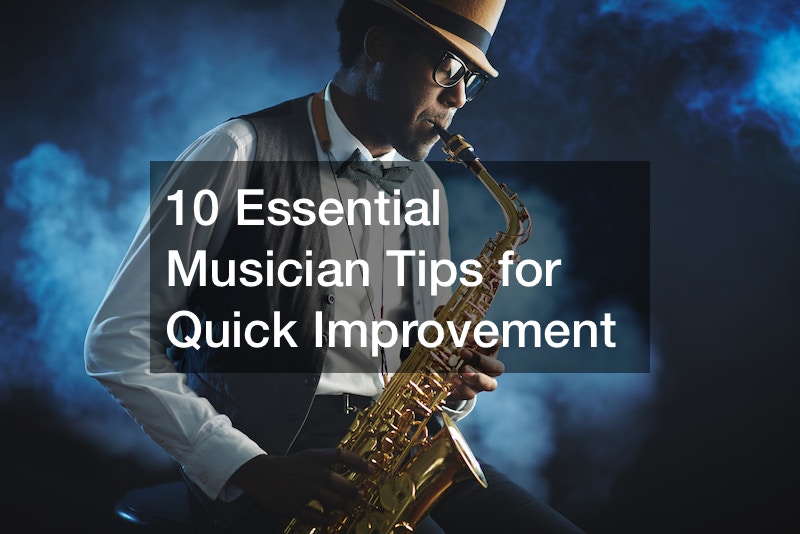
Whether you have a concert coming up or you want to pursue your dreams of being a part of a star musical act, you’ll need musician tips to improve rapidly if you want to do well in the music business. While some artists have spent years or even an entire lifetime perfecting their craft, others may be inclined to get as good at music as they can in a short period to serve their goals around music. If you want to teach music for a living, you may find that quickly improving your musical chops will make you desirable for families with children who also want to see that kind of fast growth in the music-playing department. For those who fantasize about seeing your album on the shelves in popular music stores, improving quickly may be the ticket you need to push your career trajectory over the edge.
If you’ve been playing music for a while, you may find that you only have to make a few adjustments to your current routine for practicing with your instrument of choice in your preferred genre. On the other hand, if you’ve never picked up a musical instrument in your life, you will probably need to spend some time mastering the basics and developing a disciplined practice before you can advance rapidly. While these might not be musician tips you want to hear, there’s no replacement for putting in the hours of practice it takes to get good at music. When you intend for music to remain a hobby without making you any money or garnering you fame, you may be able to make improvements to your musical abilities that satisfy the part of you that hopes to notice a change for the better in your music skills without a financial payoff.
1. Play Genres Outside Your Comfort Zone

As you’re curled up near fireplaces with your headphones in, you might only like to listen to specific genres. For a musician, being narrow-minded in your musical tastes can hurt your musical skills. Although it’s uncomfortable to venture beyond your comfort zone as a musician, you should get comfortable with practicing music that falls outside of your typical expertise.
2. Find Open Mics
Open mics can be a great place to practice performing. Some places like a sushi bar will have regular open mics. Other open mics may only happen once a year. When you find an open mic you like, you can build a musical community and notice quick improvement.
3. Try Out New Instruments
Some professionals may be inclined to give misguided musician tips that you need to purchase new high-end instruments to get the best quality sound and practice from them. For the hobbyist musician or someone who isn’t used to using a certain type of instrument yet, finding used instruments at pawn shops and thrift shops may be the best choice for your budget. Certain instruments may not be ideal to get if they’re used. For example, any instruments that require you to put your mouth on them may need to be cleaned and sanitized before you use them. Ideally, you should clean and sanitize any instrument you buy second-hand.
If you have the funds, you can buy new instruments. You can also rent them if you’re not sure if you’d like them. Some instruments like pianos may be available for practice in public settings like libraries, universities, and churches if you don’t have the funds to buy one.
4. Have a Comfortable Practice Space

Some musical instruments work best if the temperature in the home isn’t too hot or too cold. Certain instruments may also degrade over time if they aren’t kept in the appropriate conditions. This can cause your musical abilities to seem to decline when all you need to do is adjust the climate of your home.
If you notice that your home’s heating or cooling system doesn’t work as efficiently as it should, you can call an HVAC company to resolve the issue. They may need to perform an inspection to determine what might be wrong with your HVAC system, so you should clear out any instruments or other items that you keep in areas where they’ll need access. Once the HVAC system has been fixed, you may notice an instant improvement in how your instrument sounds. At the very least, you might be more comfortable with practicing your music if you aren’t too hot or too cold in the area where you do most of your musical work.
5. Create New Practice Time
If you work or attend university, it can be tough to find time to practice your music. For many of us, it’s easiest to squeeze music into our schedule after we’ve done everything else we need to accomplish for the day. When you’re a parent or caregiver, it can take even more effort to find time to devote to your musical endeavors. Still, as they say, where there’s a will there’s a way. If you have the desire to practice your music, you’ll find the time. If you don’t find the time, you’ll only be hurting yourself and your musical career.
While you might have to rearrange your scheduled Pokemon games and other activities, it’s worth it if it means that you’ll be on your way to improving as a musician. Our musician tips can sometimes turn into life tips. Time management is a skill that everyone needs regardless of whether they have aspirations of becoming a famous musician or working in another industry.
When you want to make it in a creative field like music or art, time management is even more important before your career takes off. When other musicians in your local musical scene see that you take your music seriously and protect your practice time, they may be more inclined to work with you on musical projects. The perk of spending more time with other musicians will help you improve fast since it will allow you to notice what other musicians do to perfect their craft. During jam sessions, you can casually ask other players how they do what they do and seek advice if you’re stuck in your musical progress.
6. Keep Your Instruments in Excellent Condition
Although most musician tips center on skills you can acquire and people you can meet, taking care of your instruments is a skill that will make you a better musical artist. From learning about different types of sealants for instruments to tuning your instruments regularly, there are a lot of steps you can take to ensure that your instruments last a long time. The longer an instrument lasts, the more time you’ll have to enjoy the specific sound that it offers.
When you know how to care for your instruments, you can also save money on instrument care and invest that money back into your musical chops by paying for lessons or upgrading your equipment. Taking care of an instrument shows that you respect the craft. Some small improvements to an instrument by tuning it or replacing the strings can instantly make the instrument sound better. This is the fastest way to improve the sound of the music you put out there.
7. Jam With New Players

Sometimes, you can take a break from looking for new musician tips and gather around fire pits with people who love music for the sake of jamming out. Even if you’re just kicking back and having a good time with music, you may find that you improve over time when you’re practicing around other musicians. The loose and creative environment of a jam session can spark interesting combinations that inspire you on an artistic level. They may also allow you to relax and explore your musical instrument in ways that you might struggle to attempt when you’re trying to play classical or technical musical pieces on your own.
During a jam session, you may click with certain members of the group more than others. This is a natural part of working together in a creative setting. Some folks might be interested in mentoring others if they have a lot of experience in music. If you’re looking for a musical mentor, try to go to groups with expert musicians. These players will have more to offer you than someone who is on the same level as you. If you want a mentor in music, you should develop rapport and express your intentions as you get to know more experienced musicians. Some musical artists would be flattered to know that you want them to mentor you while others may be uncomfortable with that idea. You never know unless you try speaking with them.
8. Play as Many Gigs as You Can
If you live in student housing, you can ask other musicians in your dorm building for musician tips about where to find live music gigs and open mics in the area. As they say, practice makes perfect. For many people, playing music in front of others can be a source of anxiety. Finding ways to reduce that anxiety will help you get more comfortable with performing in front of people. You may have some gigs where you make mistakes or don’t play as well as you would have liked. The point isn’t playing flawless gigs every time–it’s gaining practice and exposure while honing your skills as a musician.
9. Take Lessons
Just like how you would take a martial arts class if you wanted to get good at kung fu, our best musician tips involve honing your craft by regularly practicing and building your skills with a musical teacher. Depending on your instrument of choice, you may find it easier or harder to find a teacher who’s willing to extend their expertise and lend their time to help you improve quickly. If you want to notice improvement in your music skills quickly, you may want to build more time into your schedule to take lessons. With biweekly lessons or even lessons three times a week, you might find that you and your friends can hear a difference in your level of musical skill sooner rather than later. Inconsistency can hurt your musical abilities rather than helping them.
When you’re looking for a teacher for music, it’s wise to have a list of qualifications that a potential music teacher would need to meet before you agree to hire them. Since music lessons cost you time and money, it makes sense not to hire the first music teacher who shows up after an internet search. Treat hiring a music teacher like any other business transaction and invest your time in finding a qualified teacher.
If someone has been practicing music for as long as you have or less time, you might find that they don’t have as much to offer you as a musician if you’ve started playing music recently. Some music teachers may seem not to have as much professional experience as you might like. However, you shouldn’t immediately rule them out. They may have experience that is tougher to quantify. For example, if their parents taught them to play a difficult instrument as a young child, they may not be able to show their experience with an advanced college degree in musical fine arts but they still might be qualified for the task.
10. Network With Musicians

For those who are underaged, one of the least helpful musician tips we could give would be finding new musical professionals for connecting at a bar. Still, you must network with other musicians. Regardless of your age, you can find opportunities online or in person to connect with other musicians.
While our musician tips will not help you improve overnight, you can see some change in the quality of your musical talents in a short time if you stick with regular practice and take the necessary steps to succeed in music. There might not be a shortcut to becoming a talented, world-renowned musician. That could require a combination of luck, social connections, and creating music that speaks to a wide audience. Still, if you just want to see a positive change in how you play music within a matter of weeks or months, our tips will help get you there.


